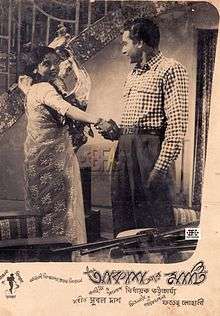Akash Ar Mati
Akash Ar Mati (The Sky and the Earth) is a 1959 black and white film directed by Fateh Lohani and produced by Film Development Corporation (FDC).[1] It was the first sound feature produced in East Pakistan (now Bangladesh) including post-production,[2] though like Mukh O Mukhosh (The Face and the Mask), the first Bengali-language film made in East Pakistan, it used some cast and crew from the West Bengal film industry.[3]
| Akash Ar Mati | |
|---|---|
 Promotional poster for Akash ar Mati | |
| Directed by | Fateh Lohani |
| Starring |
|
| Music by | Subal Das |
| Cinematography | Baby Islam |
Production companies | Film Development Corporation |
Release date |
|
| Country | East Pakistan |
| Box office | ₨0.001 crore (US$60) |
Background
Akash Ar Mati was actor-director Fateh Lohani's second venture. Satrang, an Urdu film directed by him was released in 1965.[4] He based Akash ar Mati on one of dramatist Bidhayak Bhattacharya's stories.[5] A musical film, it was thematically ambitious. But it suffered from poor technical knowledge and the inexperience of film-makers of Dhaka.[6][7] The film flopped commercially.[8]
Legendary Bangladeshi actress Sumita Devi,[9] Fazlul Karirt, Pradip, the first Bangladeshi hero Aminul Haque,[1] Dagu, Ali, Zinat, Rablul, Madhuri, Tejon, and Ranon acted in the film.[10] Baby Islam was the cinematographer.[11] Subal Das was the music director.[12]
Cast
- Sumita Devi
- Fazlul Karirt
- Madhuri
- Aminul Haque
- Rabiul Alam
See also
References
- "'Mukh O Mukhosh' hero Aminul no more…". Dhaka Mirror. August 1, 2011. Retrieved September 22, 2014.
- "Sumita Devi fighting for life". The Daily Star. November 2, 2003. Retrieved September 22, 2014.
- Vasudev, Aruna; Padgaonkar, Latika; Doraiswamy, Rashmi (2002). Being & Becoming: The Cinemas of Asia. Macmillan. p. 8. ISBN 978-0-333-93820-1.
- Hayat, Anupam (2012). "Lohani, Fateh". In Islam, Sirajul; Jamal, Ahmed A. (eds.). Banglapedia: National Encyclopedia of Bangladesh (Second ed.). Asiatic Society of Bangladesh.
- Hayat, Anupam (2012). "Bhattacharya, Bidhayak". In Islam, Sirajul; Jamal, Ahmed A. (eds.). Banglapedia: National Encyclopedia of Bangladesh (Second ed.). Asiatic Society of Bangladesh.
- Zaki, Syed Salahuddin (Summer 1995). "On Bangladesh Cinema". Indian Journal of American Studies. 25: 25.
- Film World, Volume 7, Page 90, T.M. Ramachandran, 1971
- Puja Annual, Page 200, Amrita Bazar Patrika, 1971
- Shamim, Mirza (January 7, 2014). "Sumita Devi – the queen of silver screen in 60s". Daily Sun. Archived from the original on September 24, 2014. Retrieved September 22, 2014.
- Hayat, Anupam. "A brief History of Bangladesh Cinema". Bangladesh.net. Archived from the original on June 13, 2010.
- "We lost this year: Baby Islam". The Daily Star. December 31, 2010.
- "Musician Subal Das passes away". The Daily Star. UNB. August 17, 2005. Retrieved September 22, 2014.